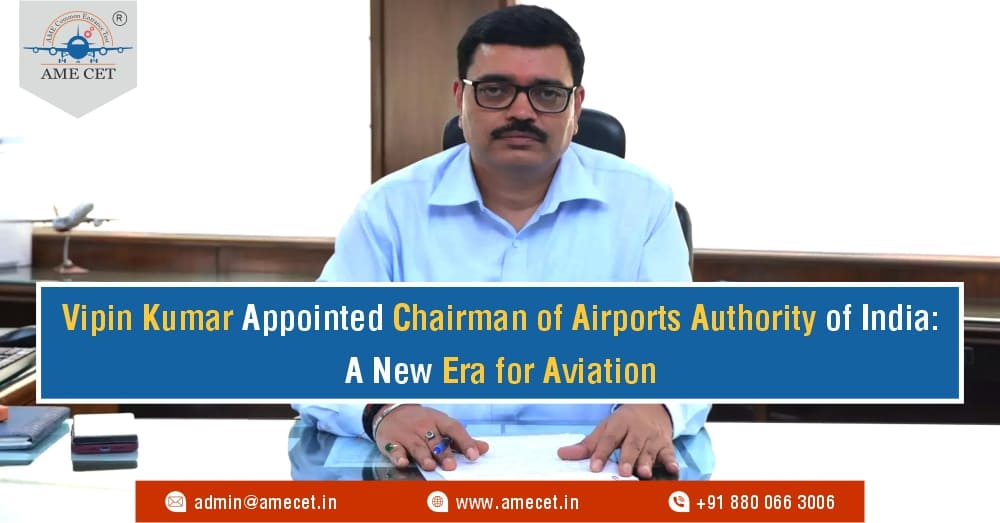
In a significant development for the Indian aviation sector, Vipin Kumar has been appointed as the new chairman of the Airports Authority of India (AAI). This appointment comes at a critical time as the aviation industry is experiencing a robust recovery post-pandemic, and Kumar’s leadership is expected to guide AAI through the challenges and opportunities that lie ahead.
Kumar brings with him extensive experience in aeronautical engineering and management, which will be invaluable as AAI continues to enhance airport infrastructure and services across the country. Under his stewardship, AAI aims to improve operational efficiency, bolster safety standards, and foster innovation in aircraft maintenance engineering.
The Importance of Aircraft Maintenance Engineering
Aircraft maintenance is a cornerstone of aviation safety, and the role of aircraft maintenance engineers is crucial. The AAI, under Kumar’s leadership, will likely focus on enhancing the quality of aircraft maintenance engineering education and training programs. This includes promoting the Aircraft Maintenance Engineering Common Entrance Test (AME CET), which serves as a gateway for aspiring aircraft maintenance engineers. The AME CET provides students with the necessary qualifications to enter the field and ensures a steady pipeline of skilled professionals for airlines like Air India, IndiGo, SpiceJet, and Vistara.
The growth of aircraft maintenance and engineering programs is vital not just for operational excellence but also for the sustainability of the aviation sector. As demand for air travel continues to increase, the need for qualified aircraft maintenance engineers becomes even more critical. Kumar’s background in aeronautical engineering will allow him to advocate for comprehensive training programs that include both theoretical knowledge and practical skills.
Enhancing Training for Ground Staff and Cabin Crew
Another focus area for the new chairman will likely be ground staff and cabin crew training. Effective ground crew training is essential for the smooth operation of airports, and with the growing number of passengers, enhancing the skills of ground staff is more important than ever. The AAI aims to implement advanced training modules that incorporate the latest technologies in airport operations.
Furthermore, as airlines expand their fleets, the need for well-trained cabin crew has also surged. Kumar’s leadership may see an increase in initiatives aimed at developing comprehensive pilot training programs, ensuring that pilots are not only well-prepared to handle various aircraft, including Boeing and Airbus models, but also adept at dealing with real-world scenarios they may face in the cockpit.
Future of Airports in India
Under Kumar’s guidance, the AAI is expected to prioritize the modernization and expansion of airports across India. With a vision of transforming airports into world-class facilities, the AAI will look to integrate advanced technologies that enhance passenger experience and streamline operations. The chairman’s insights into aeronautical engineering can significantly contribute to the development of smarter airports equipped with innovative solutions.
The growth of India’s aviation sector is not just about increasing the number of flights; it’s also about ensuring that the infrastructure can support this growth. This includes expanding runway capacities, upgrading terminal facilities, and enhancing security measures. As more airlines enter the market and competition intensifies, the focus on quality and safety will be paramount.
Collaborations with Airlines and Aerospace Industry
Kumar's appointment is also expected to strengthen collaborations between AAI and major airlines operating in India, such as Air India, IndiGo, SpiceJet, and Vistara. By fostering partnerships, AAI can work closely with these airlines to address mutual challenges, share best practices, and implement solutions that benefit the entire aviation ecosystem.
Additionally, the burgeoning aerospace industry in India offers immense opportunities for growth. Kumar’s expertise in aeronautical engineering positions him well to advocate for policies that support research and development, as well as partnerships with global aerospace companies. By aligning AAI’s goals with the broader objectives of the aerospace sector, Kumar can contribute to the development of a robust aviation framework that benefits all stakeholders.
Conclusion
The appointment of Vipin Kumar as the chairman of the Airports Authority of India signals a new chapter in the country’s aviation landscape. With a strong emphasis on enhancing aircraft maintenance engineering, improving ground staff and cabin crew training, and modernizing airport infrastructure, Kumar is poised to lead AAI towards a future characterized by growth and innovation.
As the aviation sector continues to evolve, the focus on safety, efficiency, and passenger satisfaction will remain paramount. Kumar’s leadership is expected to foster a culture of excellence within the AAI, driving the organization to meet the demands of a rapidly changing industry. With the right strategies in place, the Airports Authority of India can position itself as a global leader in aviation, ensuring that India remains a key player in the world of air travel.
Category
-
Aircraft Maintenance Engineering (DGCA) (62)
-
(269)
-
Cabin Crew (1)
-
Aerospace Engineering (3)
-
Aeronautical Engineering (2)
-
Airport Management (5)
-
Aircraft Maintenance Engineering (EASA) (6)
-
Airport Ground Staff (1)
-
Commercial Pilot License(CPL) (51)
-
Aircraft Maintenance Engineering (BTech/BE) (1)
-
B.Sc. in Aviation (1)
-
AME CET (5)
